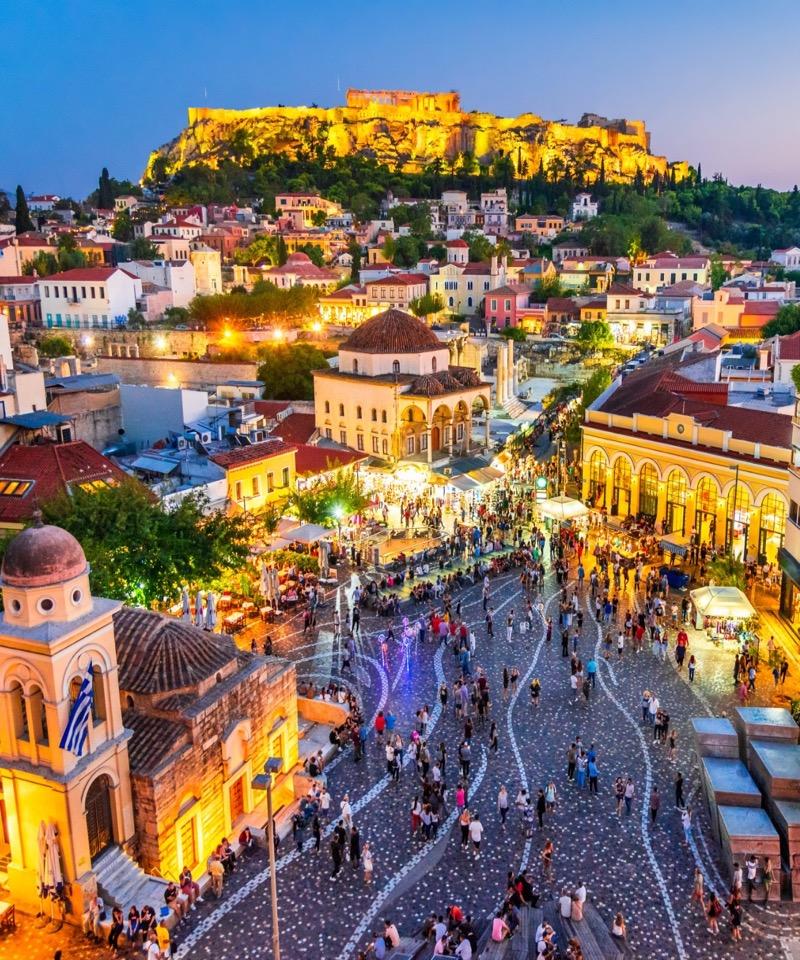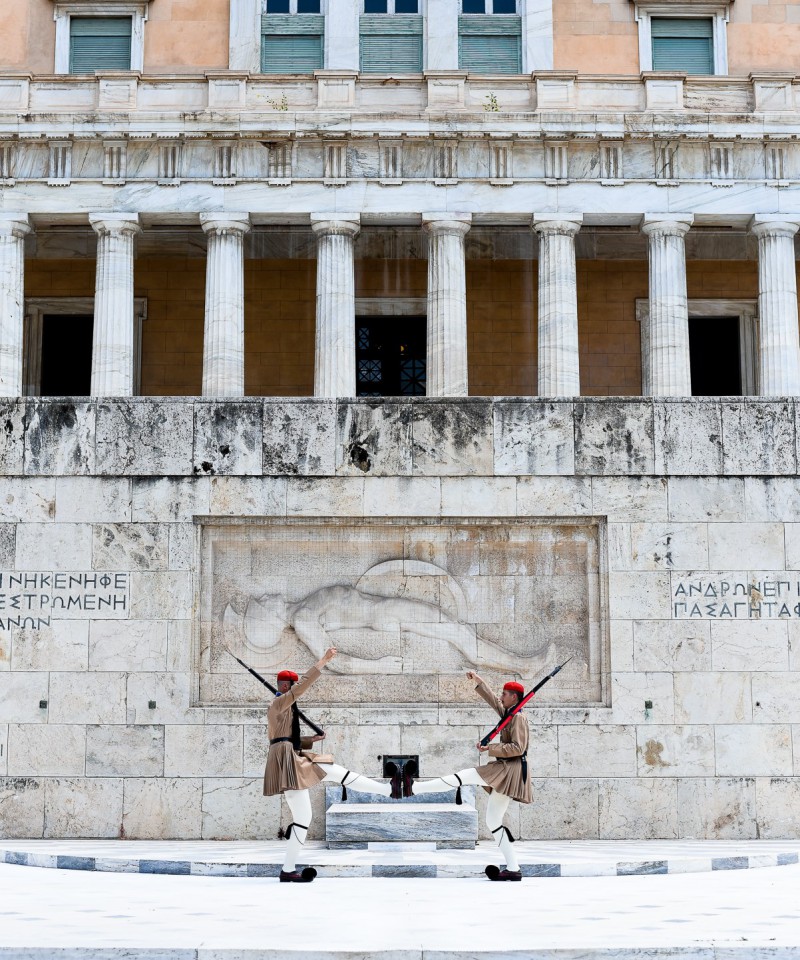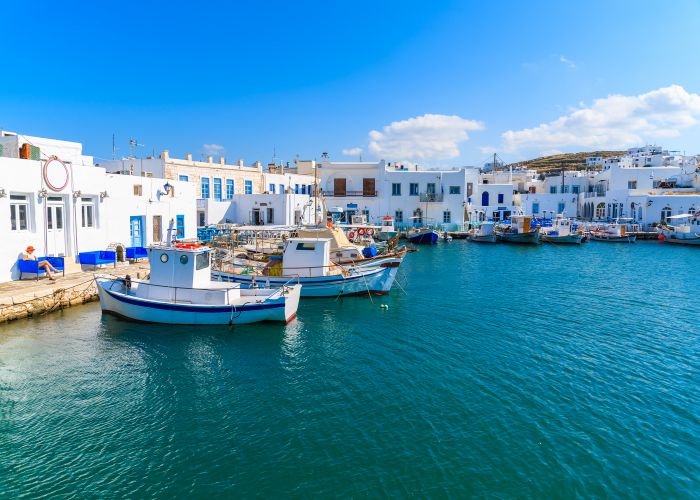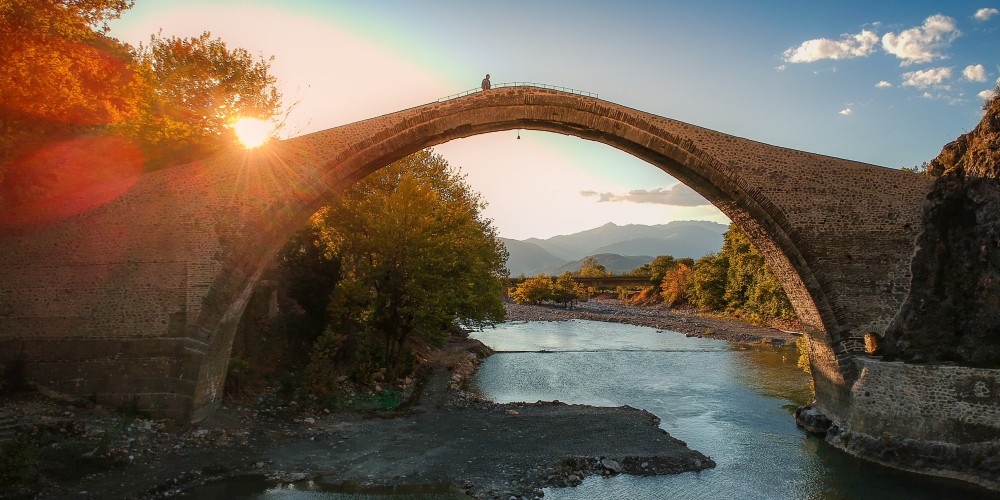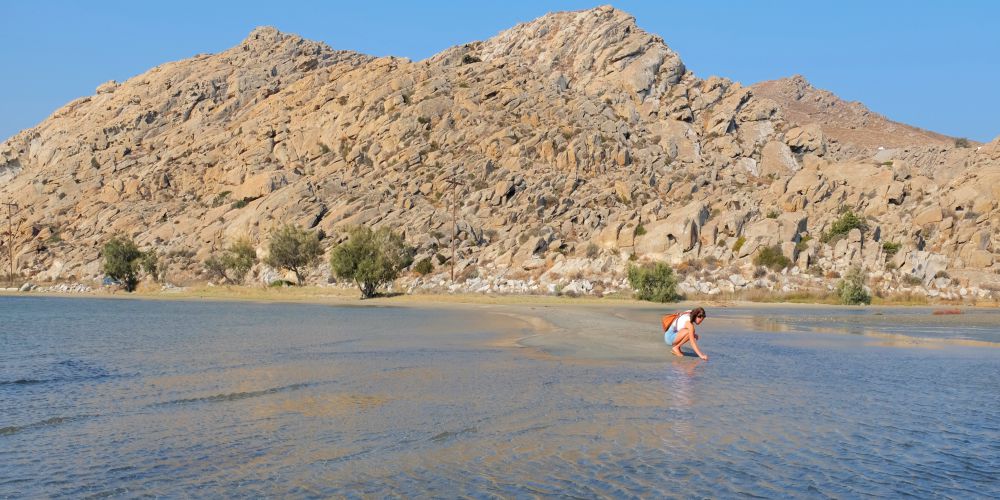
Christmas in Greece: The Definitive Guide
Key Takeaways
- Christmas in Greece is celebrated with enthusiasm. Cities and homes are adorned with festive decorations, twinkling lights, and beautifully decorated Christmas trees.
- Religious services, including Midnight Mass, are an integral part of the Christmas celebrations.
- The traditional Greek Christmas treats are not only delicious but also carry cultural significance, bringing families and communities together during the holiday season.
- In some coastal towns and islands, it is a tradition to decorate a small boat instead of a Christmas tree. The boat symbolizes Greece's strong maritime heritage and is often adorned with lights.
- One day before Christmas and New Year's, children in Greece go door to door singing Christmas carols, known as 'kalanta.
Greece. Evocative of baking heat, the Greek islands and a shimmering coastline lined with beach bars. Hardly the premier choice for a mild winter or Christmas destination? Think again.
Ever agile, visiting Greece is just as captivating in the winter as it is in the summer. From decorations to shopping, concerts to play parks, food, food, and more food, Greece is, quite simply, the one place you should be this Christmas!
For that reason, here is a definitive guide to spending Christmas in Greece, to make the most wonderful time of the year the most magical one as well.
Things to Do During Christmas in Greece
Visit a Christmas Park
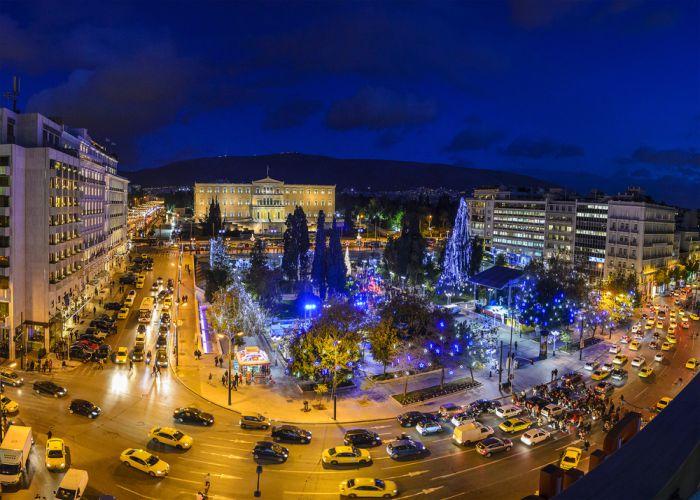
Visiting a Greek Christmas Park is always a good way to get in the festive mood, and in the center of Athens, you can find one of the best Christmas Parks in Europe, the Christmas Factory.
There, you and your kids will have the opportunity to, among others, enjoy the great Christmas market situated in magnificent wooden houses, ride the carousel, the impressive Christmas wheel, and the eco-train, and watch numerous children's performances, concerts, choirs, and interactive workshops.
If you are planning your trip to Athens and Christmas Parks tickle your fancy, you can have an unforgettable time by visiting the Christmas Factory that will not disappoint you!
Embrace the Magic of Nafplio
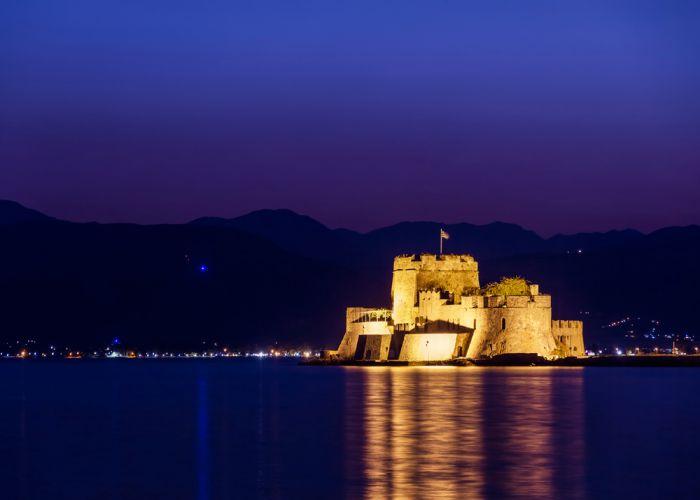
Another excellent choice, if you want to spend Christmas in Greece, is to visit the magnificent coastal town of Nafplio.
Located only 2 hours away from Athens, Nafplio, which is a striking town year-round, becomes simply enchanting under the Christmas lights.
The Old Town of Nafplio is captivatingly charming due to the cobbled streets lined with Greece Christmas decorations, and it is the ideal place to take a stroll in order to find hidden gems and shop unique memorabilia.
There are countless things to do in Nafplio. In the heart of Nafplion lies the impressive Syntagma Square, full of monuments and historic buildings, and at Christmas, boasts an impressive, huge Christmas tree.
If you are up for some exercise, you can try climbing up the legendary 999 stairs that lead to the Palamidi Castle, 216 meters above the city, in order to enjoy the breathtaking view.
Nafplio is frequently described as the cultural capital of Greece. Therefore, at Christmas, you can expect to find a variety of festive happenings, performances, and events, in order to enrich your stay.
Sing the Carols in Arachova
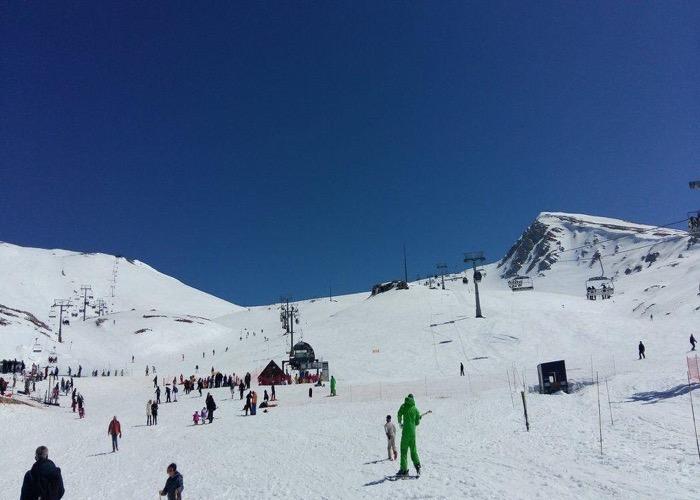
At around the same distance away from Athens, Arachova is another town, perfect for a Christmas adventure, which is waiting to be explored!
The Christmasthings to do in Arachova have an undeniable element of Christmas magic. It is arguably a visually attractive and popular Christmas destination in Greece.
Visitors are offered the opportunity to go skiing in the morning and enjoy a little après ski at the picturesque bars of Arachova in the evening. With the ski center minutes away in a breathtaking landscape, it is glamorous and elegant while staying true to its traditional roots.
At Christmas, it is truly an idyllic site with snow-capped mountains, log fires, and the sounds of festivity echoing through the cobbled streets. A golden glow effuses from the windows of small tavernas serving local red wine and warming traditional fare.
On Christmas day, you can watch, along with the locals, the Christmas traditions at the Byzantine church of St.George and admire the snowy slopes of Mount Parnassus.
Also, if you want to explore the surrounding villages, you can combine your stay at Arachova with a day trip to the spiritual heart of ancient Greece, Delphi. We promise that discovering wonders such as the Temple of Apollo, once home to a legendary Oracle, is only one of the many things to do in Delphi that will make your Christmas memorable!
Play With the Elves in Trikala
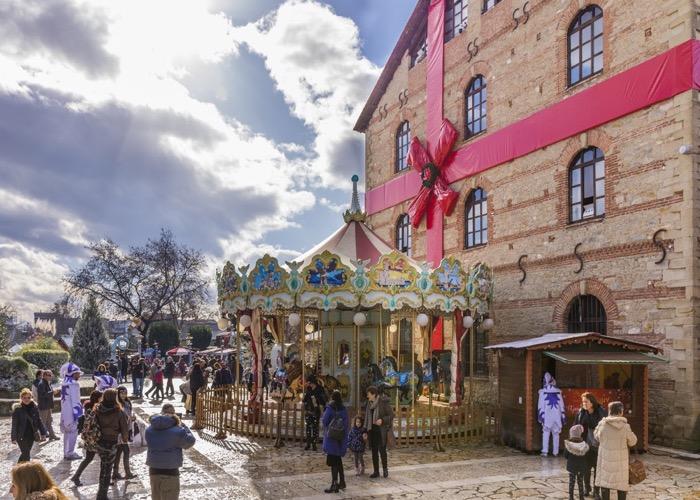
No post on Christmas would be complete without mentioning a Christmas village. About 4 hours away from Athens, at the scenic town of Trikala, Mylos ton Ksotikon -The Elves’ Mills- opens its gates every year to reveal Greek Santa’s village, should we say a magical world?
There, from 10 am to 10 pm, you can have all the fun in the world through original games to keep the children busy and delicious local food to keep the parents going!
Rumour has it that the famous Elves’ Mills work in order to produce the coveted material for all the tasty Christmas creations. In this magical village, Santa and his innumerable helpers are waiting to offer you a unique Christmas experience.
The Fun Parks, the Christmas decorations, and the abundance of free activities will excite you whether you’re young or young at heart!
Christmas in Athens
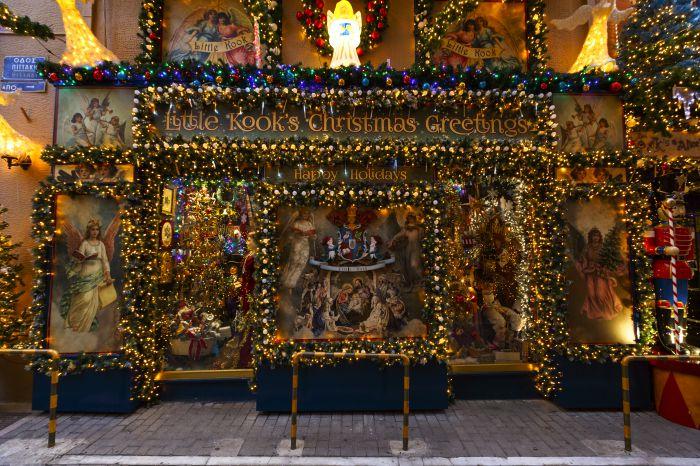
Athens is an ever-popular destination for history and archaeology, and Christmas is no exception. The scenic areas of genteel Plaka and Cycladic Anafiotika are given a festive turn with Christmas decorations adorning the streets and local establishments.
From the hills of Athens and the majestic Acropolis itself, the views of the city are truly stunning, and the milder winter weather provides perhaps a more comfortable temperature in which to walk the many archaeological sites that Athens holds.
Though famous for her sites of antiquity, Athens also displays remnants of the many civilizations that have laid claim to her walls.
From Ottoman and Frankish to Byzantine and Venetian, the city is a fascinating mix of architectural styles, much of which is beautifully framed with Christmas lights during December.
In addition to the impressive sites and landmarks, many of which have reduced rates of entry during the winter, are an impressive choice of museums, art galleries, and exhibitions. Always true to her reputation for freedom of expression, Athens holds neighborhoods that are art galleries in and of themselves.
With our talented guide and street artist, discover the works of art that adorn lesser-known streets as well as the social commentary and political messages behind them.
Whatever your interest, giving context and meaning to the history that surrounds you are our very own accomplished guides who will give you an understanding and appreciation of what an interesting city Athens really is.
Athens for Christmas Retail Therapy
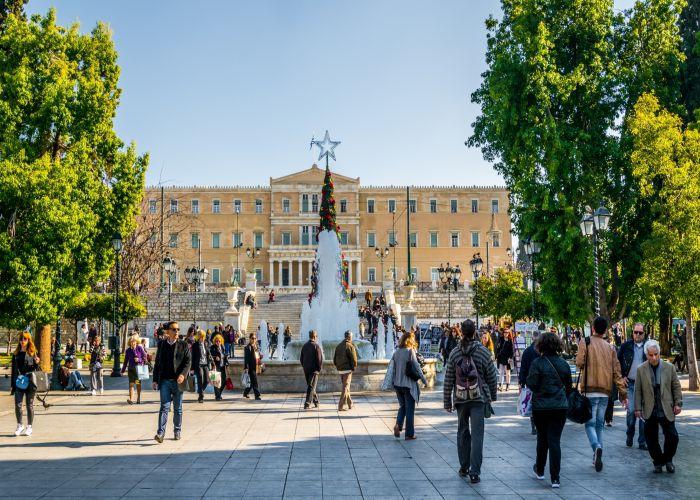
Shopping in Athens is an experience that should please just about anyone. Whether you're after department stores and brand names or quirky boutiques and antique markets, the city has plenty of opportunities for retail therapy.
Known as the busiest shopping street in the city is Ermou Street running from Monastiraki Square to Syntagma Square, which are the main Athens neighborhoods.
Hosting well-known high street brands as well as national gems such as Le Chocolat, Greece's 'temple of authentic chocolate,' it is a good place to start if you're staying in central Athens.
Monastiraki offers a lively market experience with everything from tourist wares, books, music, antiques, and a general array of trinkets that you probably will never need but can't resist buying.
The cobbled esplanade of Dionysiou Areopagitou Street offers local vendors selling handmade wares and second-hand collectibles with handy cafes nearby in which to take a rest from the shopping and take in wintery views of the Ancient Agora of Athens.
For those willing to travel a little further, the northern neighborhood of Kifisia and the southern area of Glyfada (both easily reachable with the metro) offer more luxury brands and boutique stores.
If you're traveling with children, Damigos Toy Store (in Omonia and Koukaki) is sure to be a hit. As well as modern toys, they also offer a range of vintage toys and games, so it's quite possibly an opportunity for nostalgia for the adults too!
All in all, the best places to get your Christmas shopping on, are the following:
- Ermou Street
- Monastiraki
- Dionysiou Areopagitou Street
- Kifisia
- Glyfada
Christmas in Greece - Markets & Fairs
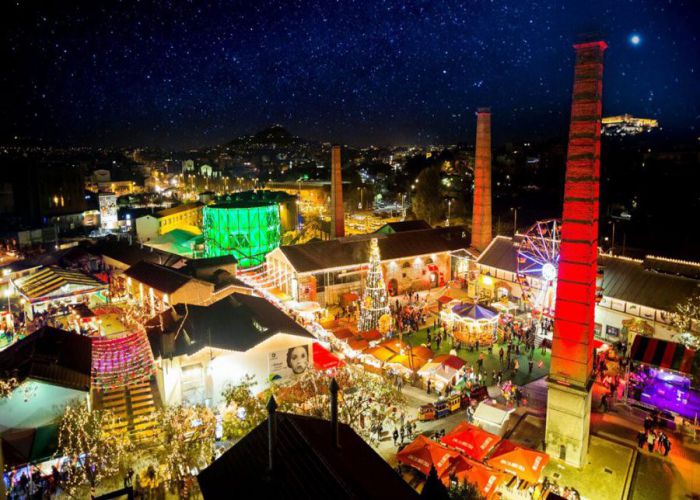
Athens is certainly not short of Christmas attractions. Whether you are visiting for some family time, a romantic couple getaway, or an intrepid solo flyer, there are some wonderfully festive spirit-infused happenings across the city in which to get into the Christmas spirit.
In Syntagma Square, you will find small stalls filled with colorful confectionery and arts and crafts.
In the National Gardens of Athens and Kotzia Square, which are some of our favorite Athens walks, there are Christmas-themed events and workshops, many of which are perfect for young families.
The crowning jewel of Athens' Christmas events, however, has to be the Christmas Factory situated in Technopolis, Gazi.
Easily accessible from the center by metro (look for Kerameikos Station, green line), the Christmas Factory is the very center of the city's Christmas celebration.
With everything from live shows, workshops, foodie stalls, carousels, Christmas gifts, and Santa's Grotto- the lineup is ever-changing, but every year it never fails to amaze.
A veritable favorite with Athenians, it's your chance to experience Christmas in Athens like a local!
Traditional Delicacies During Christmas in Greece
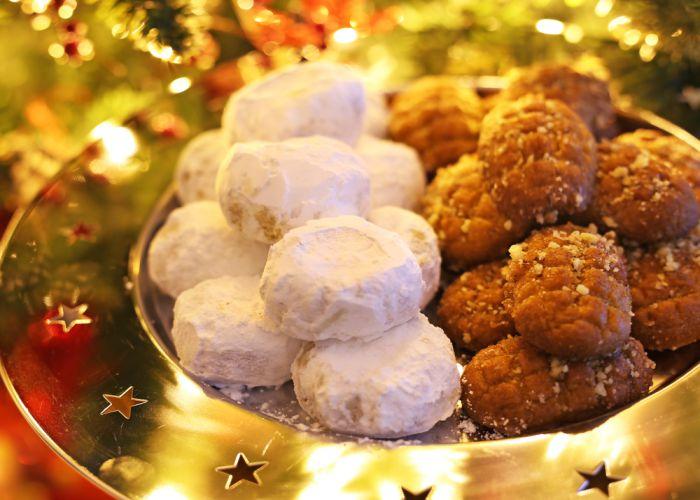
Who doesn’t want an excuse to stuff their face with delicious treats? And what could possibly be a better excuse than Christmas?
Greece is known for its magnificent food, and the festive season presents itself as another opportunity to explore the Greek cuisine that is guaranteed to -once again- impress you.
Here you will find the list of our favorite Christmas treats that you should absolutely try while visiting Greece during Christmas!
Kourabiedes: The "Snow-Covered" Cuffs
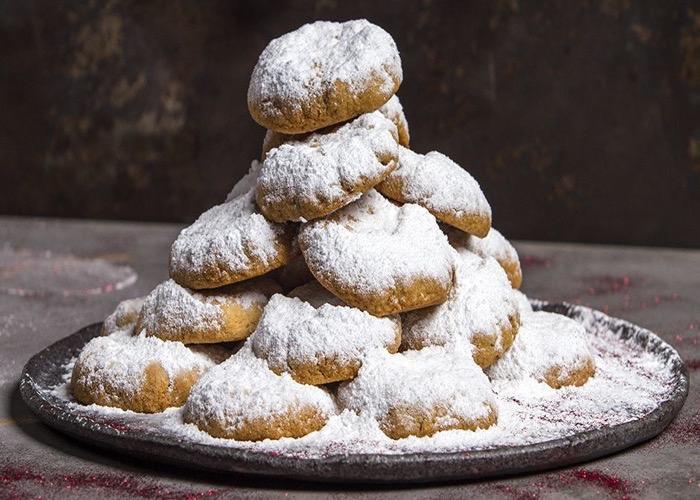
Kourabiedes are sweet Christmas cookies made from toast, butter, and almonds, all sprinkled with powdered sugar.
These traditional Greek sweets that characterize Christmas in Greece are said to have originated from Persia (first appearing in the 7th century when sugar was brought to the region) and are widespread in Greece, Turkey, and the rest of the Balkan countries.
Analyzing the Turkish word 'kurabiye,' its roots can be found in the words kuru, which means dry, and 'biye' which is a loan from the Latin word for 'biscuit.'
Biscuits are produced through a method of double baking, which has been in practice since ancient times. This allows for excess moisture to be expelled, which therefore makes the biscuit last even longer.
The Greek kourabiedes are quite similar to the Scottish shortbread in taste and are one part sugar, two parts butter, and three parts flour.
The oriental origin of kourabiedes, however, requires sheep and goat butter along with almonds, which makes it particularly distinct from the European cookies of the same family.
Although kourabiedes may not be the healthiest of the options, they are loved by many due to their rich taste and unique, crumbly texture.
Melomakarona: The Sticky Goodness
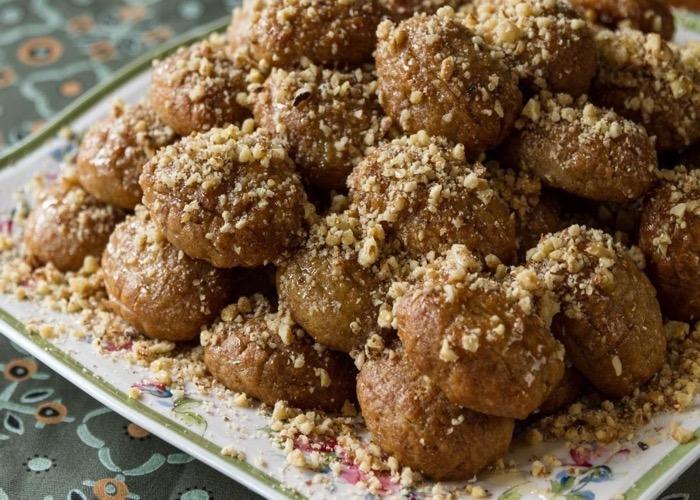
This sticky goodness was, is, and always will be our favorite Christmas treat. In Greece, the taste of melomakarona is directly connected to the joy of the Christmas holidays; however, their past is quite unexpectedly morbid. A Greek pastry made mainly from flour, semolina, olive oil, orange juice, and honey, it is one of the healthier options as it is the lowest in calories.
Melomakarona, along with kourabiedes are the traditional Greek treats that are considered indispensable in every home, mainly during the Christmas period, and in English, this sweet treat can be found under the name of the small honey cake.
Although the first thought that comes to mind is the Italian word macaroni, the name melomakarona actually comes from ancient Greece! Specifically, macaroni comes from the ancient Greek word 'macarias', which was a piece of bread in the shape of the modern melomakarona which was offered after funerals.
Later, the bread was dipped in honey syrup, got renamed melomakarono, and established as a 12-day confection. The Latins and, later the Italians used the word 'macarone' as 'maccarone,' which eventually ended up meaning spaghetti.
Finally, in France and England, a kind of almond biscuit was called macaroon (the well-known macaron). Putting their morbid history aside, the modern melomakarona are healthy and unique Christmas treats that everyone should try!
Diples: Tradition Doused in Honey
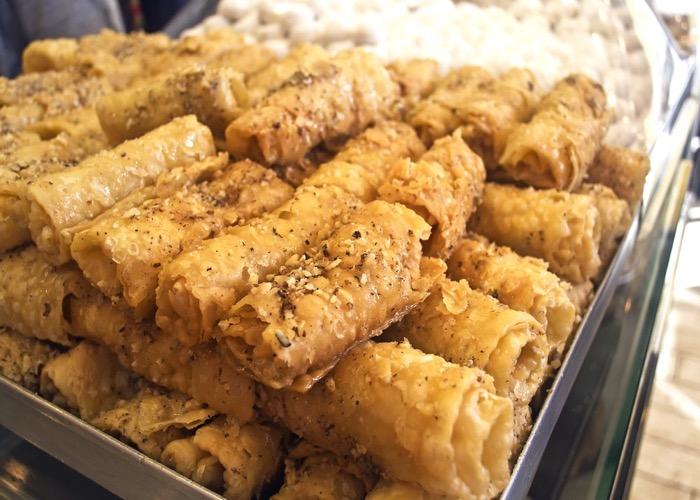
Diples (which can be translated as folds) is a Greek Christmas dessert, believed to come from the Peloponnese, in which the main ingredient is thin dough.
Not impressive, is it? Well, the thin dough may not be the most impressive of ingredients; diples, however, are arguably one of the most delicious and traditional desserts Greece has to offer.
The dough is folded into various shapes, fried in hot oil, doused in syrup or, more traditionally, honey, and finally sprinkled with cinnamon and chopped nuts. The folds can have various shapes, but they are most commonly shaped like spirals, bowls, and flowers.
Diples are usually served on New Year's Eve, but sometimes they are offered at weddings as well! The folds of diples are said to symbolize the infancy of Christ, while honey symbolizes the welfare and creativity that we want the New Year to bring us.
Xerotigana: The Cretan Diples
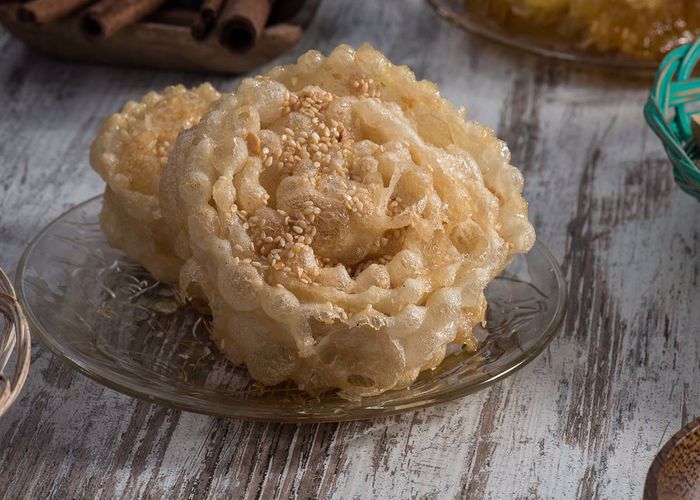 Xerotigano - credits: meli-ladi.gr
Xerotigano - credits: meli-ladi.gr
However, if you are visiting Crete during Christmas, then you may as well try the Cretan version of Diples, Xerotigana.
Despite the only difference lies in the shape and the folding of the dough, which requires a lot of skill and experience, Cretans take great pride in their version of the Christmas dessert.
As they should, this crispy, syrupy fried dough, sprinkled with walnuts, sesame seeds, and cinnamon, makes the perfect Christmas delicacy.
Lalagia: A Christmas treat from Mani
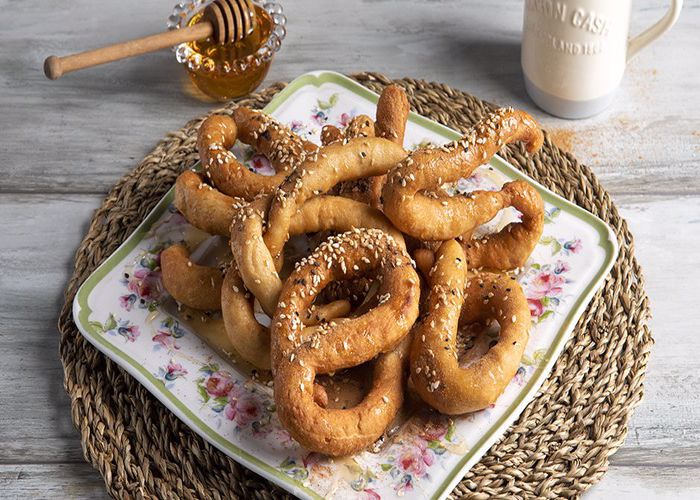 Lalagia - credits: akispetretzikis.com
Lalagia - credits: akispetretzikis.com
Considering that the Peloponnese is a magical peninsula in Southern Greece, filled with local villages to uphold traditions and Christmas customs, it is only natural to present a unique Christmas treat for you to try.
In Mani and the Messinia region, Lalagia is a must during the Christmas season.
Much like loukoumades, Lalagia will remind you of a Greek version of donuts since they are oval-shaped fried dough, served either sweet or savory, with feta cheese!
The traditional Christmas version is the one where the fried dough is sprinkled with honey and walnuts or powdered sugar.
Klostari
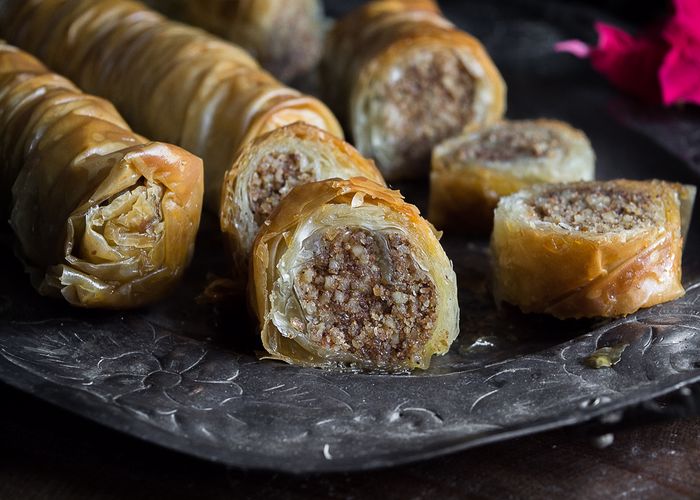 Klostari - credits: passenger.gr
Klostari - credits: passenger.gr
You’ve probably heard of Baklavas before, a traditional Greek dessert much loved ever since the Ottoman Empire, but did you know that in the Epirus region there’s a festive version of Baklavas, so they can celebrate Christmas in the sweetest way possible?
Klostari, as this traditional Christmas treat is called, is made with a crust sheet and filled with plenty of grated walnuts, honey, and cinnamon. Its name comes from the way it is made, as the walnut filling and the sheets are "spun" and strained like a thread.
If you find yourself in the beautiful city of Ioannina, you should definitely try it.
Vasilopita: The New Year’s First Taste
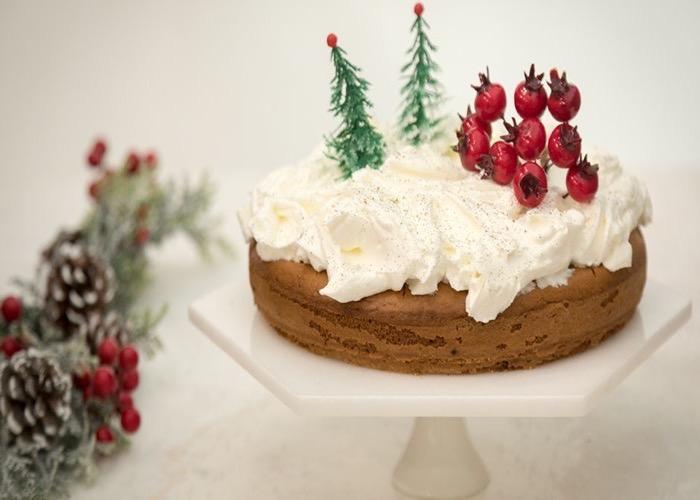
Vasilopita is the pie made in some, mostly Christian, countries on New Year’s Eve and is cut shortly after the year changes. As it is the first thing we taste, it is very important to be as good as we want the whole of the following year to be.
In Athens, it is made mainly of flour, eggs, sugar, and milk. It can come in various sizes and types but is usually fluffy and sweet.
In Western Macedonia, vasilopita is often made with cheese or even parsley. Also, on the vasilopita, the New Year's number is often written with either some type of marmalade, rows of peeled almonds, or powdered sugar.
Regardless of whether they are sweet or savory, they all have one thing in common: an unusual New Year’s Eve custom according to which, inside the pie, one should place a gold or silver coin.
With the coming of the New Year, the mother of the family cuts the pie into triangles; a slice is then offered to each person except for three pieces which are dedicated to Christ, the Virgin & the home.
These slices are then eaten on the following days. The one who finds the hidden coin in their piece is believed to be rewarded with good luck for the rest of the New Year!
You would be lying if you claimed that all this talk about Christmas treats hasn't left you craving all the Christmas goodies you can find. We apologize in advance for having wrecked your diet.
However, we do not apologize for the opportunity that we gave you to get to know the Christmas treats of Greece because the Greek Christmas experience cannot be considered complete without them.
Remember, Greece isn’t just sunny days and endless beaches! Figure out all the reasons why you will visit Greece in winter and fall in love with Greece in the off-season!
Christmas in Greece Traditions - How Does Greece Celebrate Christmas?
The Kallikantzaroi
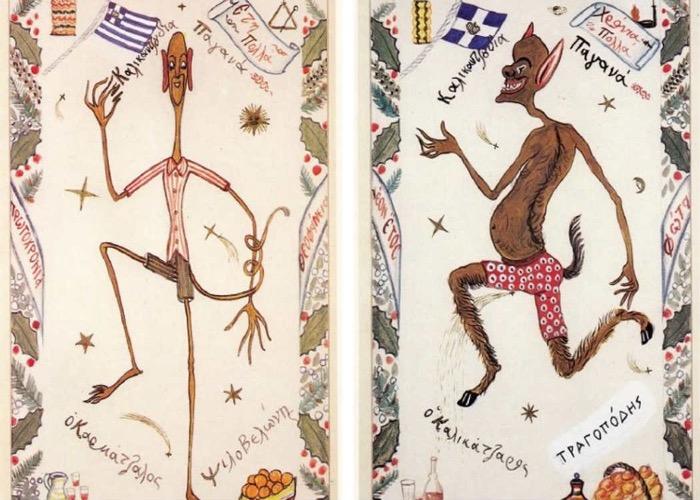
According to the Greek folklore tradition, there is only one thing to be afraid of during Christmas, the Kallikantzaroi. This magical beast varies in appearance from place to place and can be found in the tradition of other countries too.
For the Greeks, a Kallikantzaros is a creature of the night, sometimes tall as a human or a dwarf with a weird posture and long limbs.
During the whole year, these demons have only one job: to slowly saw down the primal trunk of the tree of life that supports the Earth from falling into the Underworld.
By the time of the winter solstice, much of their job is done, and terrified that the world will collapse upon them, they sneak into burrows to find their way to the world of the living.
For almost a fortnight, and as long the sun is not moving from its position in the skies, they are free to roam the earth and fling themselves into every mischief and deviltry they can think of.
From the 25th of December to the 6th of January, the Kallikantzaroi spread terror to the world. They come in packs, but they can easily be tricked due to their very low intelligence. One way to protect from them is to put a colander on your doorstep.
The creature will start counting the holes, and since it is not able to count over the number two, it will eventually get distracted by something else and leave you safe and sound.
The two days when it is safe to walk outside of your place unprotected are Christmas and New Year’s Eve. Since baby Jesus is born on Christmas, all the angels and saints are attesting to his birth, and the world is safe from any evil.
On New Year’s Eve, Saint Basil the Great, the Greek Santa Claus, walks on earth and keeps the evil spirits away while offering his gifts and help to those in need. This is why kids are allowed to wander the neighborhoods and sing the carols collecting candy and delicious treats!
On January the 6th, the day of Epiphany, the priests are purifying the waters of the world on the occasion of the Baptism of Jesus, and the sun starts moving again in the sky.
Terrified by those events, the Kallikantzaroi scream to each other to return to the bowels of the earth only to discover that the holy water has regenerated the tree of life. This will keep them busy for the year to come.
The 'Gourounohara' and the 'Marriage of Fire'
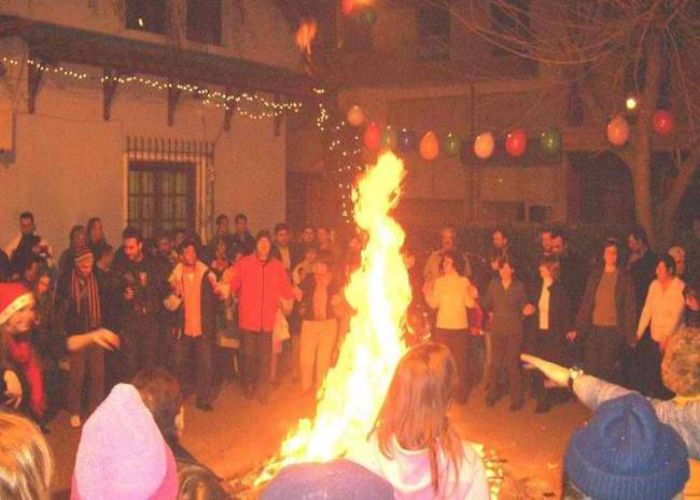
In Thessaly, one of the most famous Christmas customs and traditions in Greece is the slaughter of the pig or, in other words, the 'gourounohara.'
On Christmas Eve, in many parts of Greece, it is customary to "marry" the fire. This presupposes the marriage of a 'female' wood (e.g., cherry) and a 'male' (e.g., cedar).
The girls of the family put twigs from the 'male," and the boys put twigs from the 'female' next to the lit fireplace.
The 'Lit Holly'
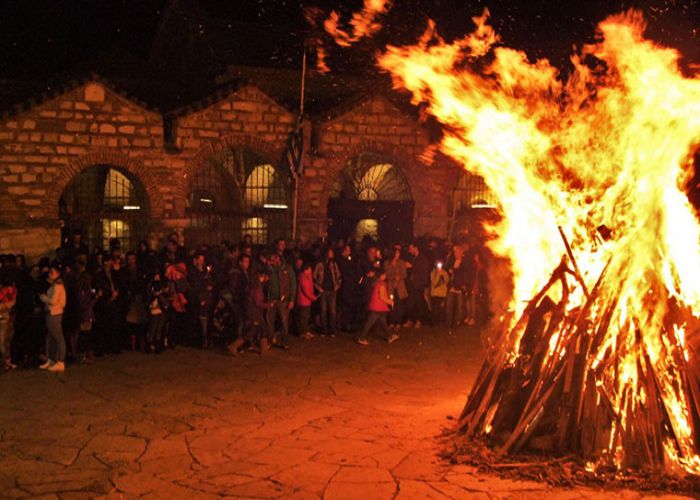
In Epirus, people usually hold a holly branch in their hand when visiting friends or neighbors during Christmas, which they light on the street and fill the dark paths or alleys with light.
This custom is based on an old eastern Orthodox tradition that wants the shepherds who visited the manger of Christ to worship, to light oaks, to find their way through the dark mountain.
Ragoutsaria in Kastoria
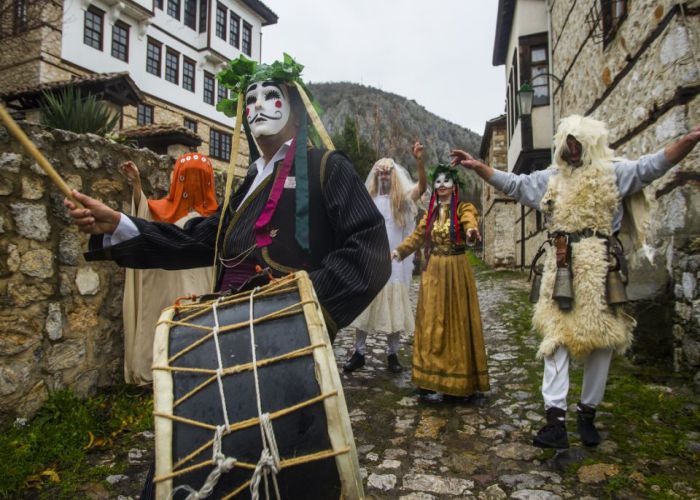
In the heart of winter and during the last hours of the twelve days, the city of Kastoria surrenders to a unique three-day feast of joy and spree, which is spontaneously born in the countless groups of young and old who take part.
On January 6, 7, and 8, the streets and alleys of the city are filled with disguised people who rejoice, party, and dance, spreading joy and fun all around.
The Lucky Onion on the Door

An integral part of decorating for Christmas is putting a Christmas wreath on your door. Now, take down that wreath and make some space to put your jolly, Christmasy squill!
This bizarre custom of hanging uprooted onions on their doors is something that Greeks have done for centuries during the Christmas season.
This type of squill, scientifically named Drimia Maritima, can be found throughout the Mediterranean region and almost everywhere in Greece.
According to tradition, every New Year’s Eve, a member of each family uproots this bulb from the soil and hangs it on the door.
The reason? This bulb is so resistant to any conditions that -even uprooted- it still continues to grow large spear-like leaves and a white flower.
Therefore, it was and still is considered a symbol of fertility and immortality, two things necessary for the New Year to come.
The Greek Christmas Eve Dinner
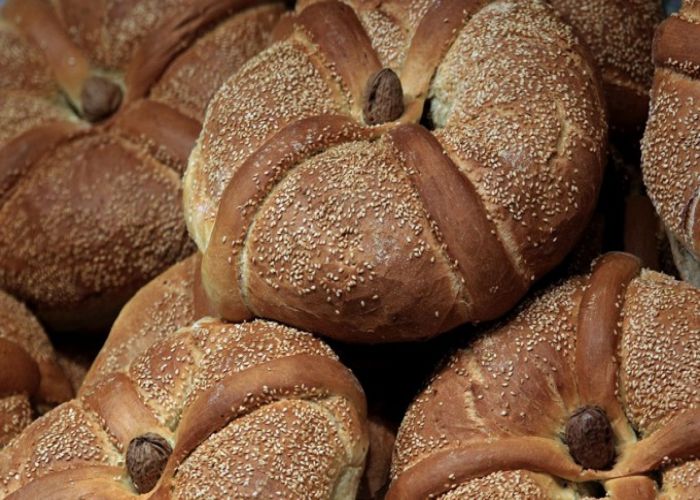
Who does not know the famous Nat King Cole song? "Everybody knows a turkey and some mistletoe help make the season bright."
And surely they do! But how about replacing the roasted turkey with some pork stew? Despite the fact most people can not think of a Christmas table without a stuffed turkey, Greece says otherwise.
Turkey is not indigenous to the Greek region, therefore, there it is not included in typical Greek cuisine, something you can easily discover in our Greek food guide. Hence, for centuries, the warming Christmas dish that everyone was waiting for was a plate of hot pork stew with celery and herbs, always alongside Greek spirits, of course, that go beyond Greek wine culture!
In other Greek provinces, the custom dictated roasted pork with vegetables, but everyone agrees on the fact that Christopsomo is a must-have addition to their Christmas table.
Christopsomo is a type of blessed bread that Greek people prepare deliberately for Christmas days, and it is often decorated with elaborate patterns on its upper surface.
How Do They Celebrate Christmas in Greece?
Every corner of Greece, from one end to the other, has Greek Christmas traditions and customs that have their roots deep in time.
Each region has its own special customs on Christmas day. However, some are common for everyone, such as the decoration of the Christmas tree, the carol-singing the day before singing, and the big family dinners full of delicious food on Christmas day.
Children from all over Greece go from door to door, singing cheerful Greek Christmas carols. This custom resembles the trick-or-treat-ing of Halloween but is a lot less gruesome.
The carols have a mixture of religious and secular content. In the beginning, the religious event is announced and described, and then, the praises for the different members of the family follow depending on their talents, their age, their profession, or their social position.
What is Santa Claus Called in Greece?

In Greece, Santa is not coming on Christmas Eve but on New Year’s Eve. Why? Because the Greek Santa is rather different from the known one.
His name is Agios Vasilis, and he is one of the Three Holy Hierarchs of Christianity. He lived in the 4th century and was the bishop of Caesarea in Cappadocia, nowadays Turkey.
One of the most influential hierarchs of early Christianity, he shaped the newly-born Christian Church through his pluralistic knowledge of theology, philosophy, and politics.
During his studying years, he moved to Athens, the most prestigious academic environment of that time, and got befriended Gregory of Nazianzus (the second Holy Hierarch) and even the Roman Emperor Julian the Apostate.
According to legend, St. Basil the Great led a virtuous life, having at the center of his focus the benefaction of the poor ones and especially young kids. One event of his life, though, is commemorated every New Year’s Eve in every Greek household.
During his office as a bishop of Caesarea, Saint Basil had to deal with a siege from an enemy army. In order to keep everyone safe, he asked the wealthy citizens of Caesarea to collect as much money as possible to pay a ransom for the protection of the city.
St. Basil handed the money to the invader only after scolding him about the injustice of his acts. Persuaded that his actions were against the word of God, the leader of the enemy army ordered the withdrawal of his men and left the city unharmed.
The next day, St. Basil had to confront the following situation: he had to return the money to the citizens, but he did not know how much money each person had contributed to the cause. Instead, he came up with another solution.
He prepared batches of Christmas bread, and inside each loaf, he placed a golden coin. By sharing them in the morning mass, he made sure that all the money was returned to the city but this time, it was redistributed to everyone.
The custom of re-enacting this event is honored every year with the preparation of Vasilopita, a pie that bears the name of the saint. Every household hides a golden coin in the pie, and then it is shared with all the family members.
The person to find the lucky coin hidden inside is the winner of the night, and he is granted the blessings of a year of luck and prosperity.
What is the Main Symbol of Christmas in Greece? (Spoiler Alert: it's not the Christmas tree)
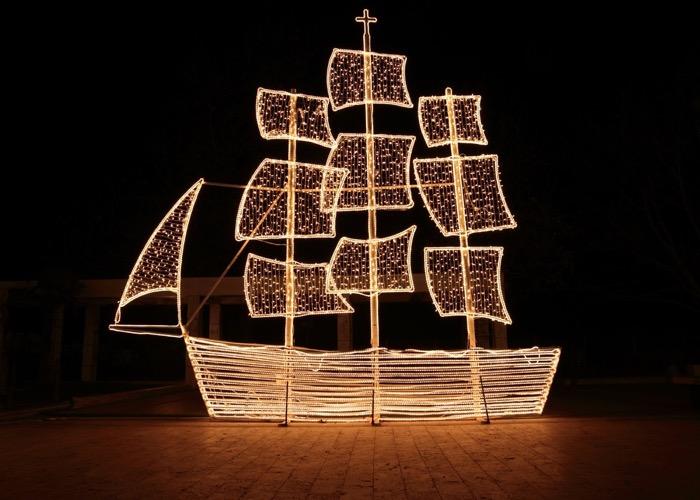
The centerpiece of every household during the Christmas season is the adorned Christmas tree. Putting up a tree inside your home never crossed the mind of the Greeks, and therefore, this custom was completely alien in Greece until the end of the 19th century.
Truth is, it really started catching up only after the 1950s. Traditionally, Greeks decorate wooden boats in their houses and decorate it with colorful sails and candy. Well, this totally crazy idea has a very good reason behind it.
Just by looking at the map, one can see that the country is literally surrounded by water, and consequently, one of the most popular professions were sailors, fishermen, or captains.
A large amount of the Greek population used to make their living out in the sea, and most of the time, they remained separated from their families for quite some time.
On Christmas Eve, young children used to fashion small Christmas boats out of perishable materials, and with the company of musical instruments and their friends, they used to wander the neighborhoods singing Christmas carols.
In this Greek version of trick or treating, the children used to collect many candies and holiday treats on this small boat while searching for the next door to knock on.
Eventually, through the passing of centuries, the custom of putting up a small Christmas boat came to be the true Greek tradition.
The first time a Christmas tree was decorated in Greece was in 1833 when King Otto, following his traditions, put up a tree in his palace. At that time, the Greeks that saw that spectacle considered the fact that maybe their king was out of his mind.
After the middle of the 20th century, more and more houses started buying Christmas trees resulting in the prevalence of this tradition instead of the humble boat.
Today, not a single Greek home misses its Christmas tree, but there is always a place for the small boat nearby.
Why Has the Greek Orthodox Church Picked December 25 for celebrating Christmas? When is Christmas in Greece?
Today, we take it for granted that Christ was born on December 25th. In the early Christian centuries, however, Christ's birth was the subject of endless debate.
The decision for December 25 was taken in 336 AD, and the reason was that an important celebration of the Greeks and Latins had to be replaced.
Believers of the former religion celebrated in those days the great feast of the birth of the Sun (Dies Solis Invectis Natalis). In astronomy, December 23-25 is also the day of the winter solstice.
Final Thoughts
Christmas in Greece is a wonderful experience whether you choose to spend it by the sea or in the mountains. Here, you can visit Christmas Villages and Christmas Parks and enjoy scenic landscapes in Athens and out in the countryside.
The fairy tale holiday season charms locals and visitors alike, offering countless entertainment options. Theatrical performances, music concerts, outdoor meetings, and Christmas bazaars, all contribute to the Christmas glee! We hope you liked our Greece Christmas guide and are ready to make the winter trip a reality by booking one of Greece vacation packages!
Happy Greecemass, everyone!





